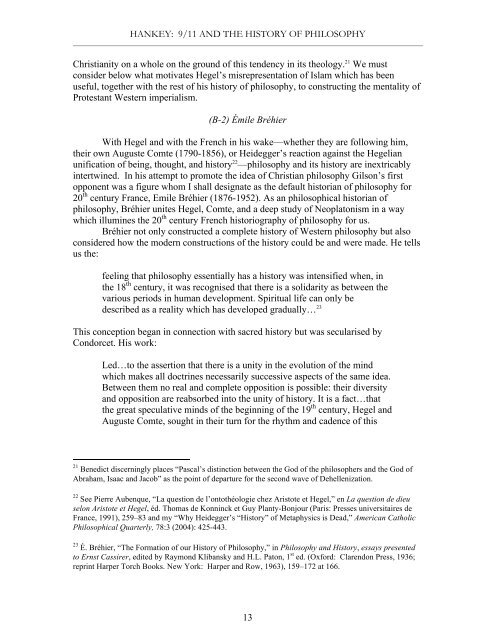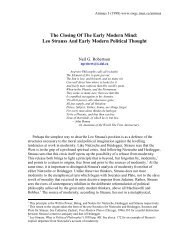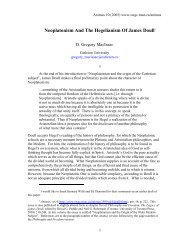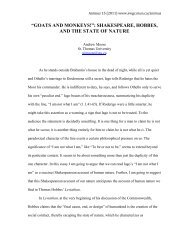HANKEY: 9/<strong>11</strong> AND THE HISTORY OF PHILOSOPHYneoplatonised, had surreptitiously crept.” 16 This is a very different view <strong>of</strong> philosophyfrom that which Aquinas found among ei<strong>the</strong>r his Christian or his pagan Hellenic sources<strong>and</strong> sets <strong>the</strong> point <strong>of</strong> departure for <strong>the</strong> Summa Theologiae, providing what moves him toestablish for Latin Christians <strong>the</strong> basis <strong>of</strong> a secular humanism. 17 Hegel’s treatmentbecomes deeply problematic—not to say polemical—when he goes on to describe <strong>the</strong>Kalām. Hegel is very clear that his source, Maimonides, is describing a movement inphilosophical <strong>the</strong>ology which Rambam rightly supposed began among ByzantineChristians, which spread from <strong>the</strong>m to Jewish <strong>and</strong> Islamic <strong>the</strong>ologians, <strong>and</strong> whichMaimonides, st<strong>and</strong>ing on <strong>the</strong> shoulders <strong>of</strong> his Islamic philosophical co-workers,opposed. 18 Maimonides cannot be blamed for Hegel’s polemical misrepresentation; hehas a proper veneration for <strong>the</strong> Islamic Peripatetics to whom he owes his philosophicaleducation. Hegel takes Maimonides’ description <strong>of</strong> <strong>the</strong> most extremely voluntaristic sect<strong>of</strong> <strong>the</strong>se dialectical <strong>the</strong>ologians—a position which may be compared to <strong>the</strong> most extremeCalvinistic predestinarianism or Malebranche’s occasionalism among Christians—todescribe <strong>the</strong> Islamic idea <strong>of</strong> God itself <strong>and</strong> its philosophical result. 19 Benedict XVI maybe a victim <strong>of</strong> <strong>the</strong> continuation <strong>of</strong> Hegel’s polemical misrepresentations among Germanintellectual historians. Although <strong>the</strong> Pope himself would not make this mistake, acondemnation <strong>of</strong> Islam by Christians on this basis forgets that an extreme voluntarismcontinually repeats itself within Christianity especially among those under <strong>the</strong> influence<strong>of</strong> Augustine. 20 Unless <strong>the</strong>y had no access to Christian thinkers except <strong>the</strong> most extremeAugustinians between Duns Scotus <strong>and</strong> Pascal, fair-minded judges would not condemn16 Alain de Libera, Penser au Moyen Âge (Paris: Seuil, 1991), 20. For brief description <strong>of</strong> thisAristotelianism, see idem, La querelle des universaux: De Platon à la fin du Moyen Age, Des travaux(Paris: Seuil, 1996), <strong>11</strong>7 <strong>and</strong> 68-124.17 See my “Aquinas at <strong>the</strong> Origins <strong>of</strong> Secular Humanism? Sources <strong>and</strong> innovation in Summa Theologiae I,q. 1, a.1,” Nova et Vetera [The English Edition <strong>of</strong> <strong>the</strong> International Theological Journal], 5:1 (2007): 17-40.18 Hegel’s Lectures, iii, 27-28, 30-31, 35-36.19 For an example <strong>of</strong> a continuation <strong>of</strong> <strong>the</strong>se errors <strong>and</strong> polemics in <strong>the</strong> American imperial interest see FloyElizabeth Doull, “Wanted: A Philosophical Foundation for <strong>the</strong> Equality <strong>of</strong> Religion <strong>and</strong> Culture inCanada,” in Multiculturalism <strong>and</strong> Religious Freedom, ed. Susan Harris (Charlottetown: St. PeterPublications, 2005), 157-186. For an example <strong>of</strong> <strong>the</strong> best kind <strong>of</strong> alternative see Ernest Wolf-Gazo,“Contextualizing Averroes within <strong>the</strong> German Hermeneutical Tradition,” Journal <strong>of</strong> Comparative Poetics,16 (1996): 133-163.20 Benedict acknowledges in “Faith, Reason <strong>and</strong> <strong>the</strong> University”: “In all honesty, one must observe that in<strong>the</strong> late Middle Ages we find trends in <strong>the</strong>ology which would sunder this syn<strong>the</strong>sis between <strong>the</strong> Greek spirit<strong>and</strong> <strong>the</strong> Christian spirit. In contrast with <strong>the</strong> so-called intellectualism <strong>of</strong> Augustine <strong>and</strong> Thomas, <strong>the</strong>re arosewith Duns Scotus a voluntarism which, in its later developments, led to <strong>the</strong> claim that we can only knowGod's voluntas ordinata. Beyond this is <strong>the</strong> realm <strong>of</strong> God's freedom, in virtue <strong>of</strong> which he could have done<strong>the</strong> opposite <strong>of</strong> everything he has actually done. This gives rise to positions which clearly approach those <strong>of</strong>Ibn Hazn <strong>and</strong> might even lead to <strong>the</strong> image <strong>of</strong> a capricious God, who is not even bound to truth <strong>and</strong>goodness. God's transcendence <strong>and</strong> o<strong>the</strong>rness are so exalted that our reason, our sense <strong>of</strong> <strong>the</strong> true <strong>and</strong> good,are no longer an au<strong>the</strong>ntic mirror <strong>of</strong> God, whose deepest possibilities remain eternally unattainable <strong>and</strong>hidden behind his actual decisions.”12
HANKEY: 9/<strong>11</strong> AND THE HISTORY OF PHILOSOPHYChristianity on a whole on <strong>the</strong> ground <strong>of</strong> this tendency in its <strong>the</strong>ology. 21 We mustconsider below what motivates Hegel’s misrepresentation <strong>of</strong> Islam which has beenuseful, toge<strong>the</strong>r with <strong>the</strong> rest <strong>of</strong> his history <strong>of</strong> philosophy, to constructing <strong>the</strong> mentality <strong>of</strong>Protestant Western imperialism.(B-2) Émile BréhierWith Hegel <strong>and</strong> with <strong>the</strong> French in his wake—whe<strong>the</strong>r <strong>the</strong>y are following him,<strong>the</strong>ir own Auguste Comte (1790-1856), or Heidegger’s reaction against <strong>the</strong> Hegelianunification <strong>of</strong> being, thought, <strong>and</strong> history 22 —philosophy <strong>and</strong> its history are inextricablyintertwined. In his attempt to promote <strong>the</strong> idea <strong>of</strong> Christian philosophy Gilson’s firstopponent was a figure whom I shall designate as <strong>the</strong> default historian <strong>of</strong> philosophy for20 th century France, Emile Bréhier (1876-1952). As an philosophical historian <strong>of</strong>philosophy, Bréhier unites Hegel, Comte, <strong>and</strong> a deep study <strong>of</strong> Neoplatonism in a waywhich illumines <strong>the</strong> 20 th century French historiography <strong>of</strong> philosophy for us.Bréhier not only constructed a complete history <strong>of</strong> Western philosophy but alsoconsidered how <strong>the</strong> modern constructions <strong>of</strong> <strong>the</strong> history could be <strong>and</strong> were made. He tellsus <strong>the</strong>:feeling that philosophy essentially has a history was intensified when, in<strong>the</strong> 18 th century, it was recognised that <strong>the</strong>re is a solidarity as between <strong>the</strong>various periods in human development. Spiritual life can only bedescribed as a reality which has developed gradually… 23This conception began in connection with sacred history but was secularised byCondorcet. His work:Led…to <strong>the</strong> assertion that <strong>the</strong>re is a unity in <strong>the</strong> evolution <strong>of</strong> <strong>the</strong> mindwhich makes all doctrines necessarily successive aspects <strong>of</strong> <strong>the</strong> same idea.Between <strong>the</strong>m no real <strong>and</strong> complete opposition is possible: <strong>the</strong>ir diversity<strong>and</strong> opposition are reabsorbed into <strong>the</strong> unity <strong>of</strong> history. It is a fact…that<strong>the</strong> great speculative minds <strong>of</strong> <strong>the</strong> beginning <strong>of</strong> <strong>the</strong> 19 th century, Hegel <strong>and</strong>Auguste Comte, sought in <strong>the</strong>ir turn for <strong>the</strong> rhythm <strong>and</strong> cadence <strong>of</strong> this21 Benedict discerningly places “Pascal’s distinction between <strong>the</strong> God <strong>of</strong> <strong>the</strong> philosophers <strong>and</strong> <strong>the</strong> God <strong>of</strong>Abraham, Isaac <strong>and</strong> Jacob” as <strong>the</strong> point <strong>of</strong> departure for <strong>the</strong> second wave <strong>of</strong> Dehellenization.22 See Pierre Aubenque, “La question de l’ontothéologie chez Aristote et Hegel,” en La question de dieuselon Aristote et Hegel, éd. Thomas de Konninck et Guy Planty-Bonjour (Paris: Presses universitaires deFrance, 1991), 259–83 <strong>and</strong> my “Why Heidegger’s “<strong>History</strong>” <strong>of</strong> Metaphysics is Dead,” American CatholicPhilosophical Quarterly, 78:3 (2004): 425-443.23 É. Bréhier, “The Formation <strong>of</strong> our <strong>History</strong> <strong>of</strong> <strong>Philosophy</strong>,” in <strong>Philosophy</strong> <strong>and</strong> <strong>History</strong>, essays presentedto Ernst Cassirer, edited by Raymond Klibansky <strong>and</strong> H.L. Paton, 1 st ed. (Oxford: Clarendon Press, 1936;reprint Harper Torch Books. New York: Harper <strong>and</strong> Row, 1963), 159–172 at 166.13
















